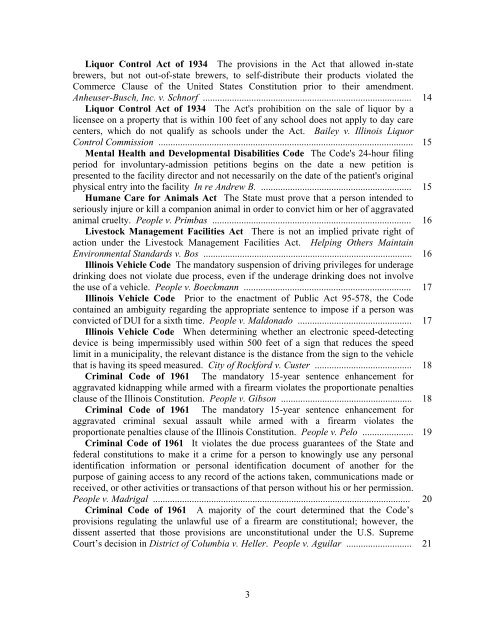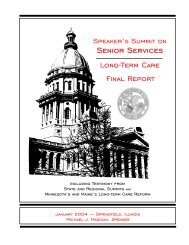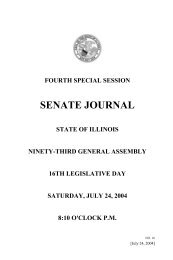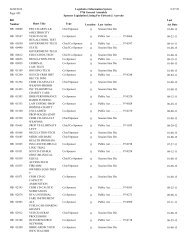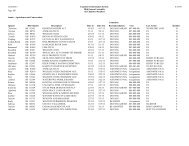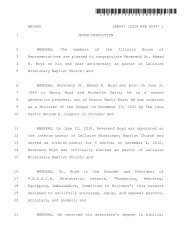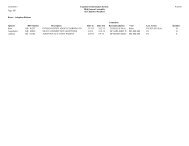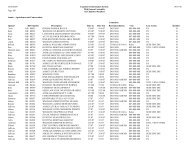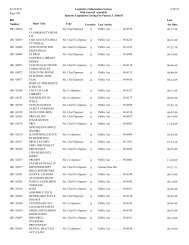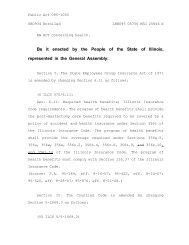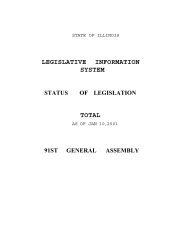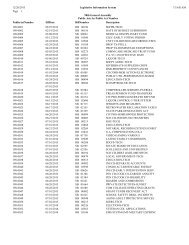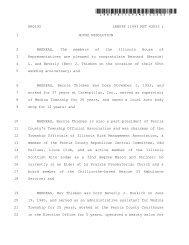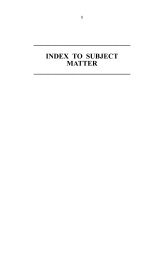2011 CASE REPORT - Illinois General Assembly
2011 CASE REPORT - Illinois General Assembly
2011 CASE REPORT - Illinois General Assembly
You also want an ePaper? Increase the reach of your titles
YUMPU automatically turns print PDFs into web optimized ePapers that Google loves.
Liquor Control Act of 1934 The provisions in the Act that allowed in-state<br />
brewers, but not out-of-state brewers, to self-distribute their products violated the<br />
Commerce Clause of the United States Constitution prior to their amendment.<br />
Anheuser-Busch, Inc. v. Schnorf ...................................................................................... 14<br />
Liquor Control Act of 1934 The Act's prohibition on the sale of liquor by a<br />
licensee on a property that is within 100 feet of any school does not apply to day care<br />
centers, which do not qualify as schools under the Act. Bailey v. <strong>Illinois</strong> Liquor<br />
Control Commission ......................................................................................................... 15<br />
Mental Health and Developmental Disabilities Code The Code's 24-hour filing<br />
period for involuntary-admission petitions begins on the date a new petition is<br />
presented to the facility director and not necessarily on the date of the patient's original<br />
physical entry into the facility In re Andrew B. .............................................................. 15<br />
Humane Care for Animals Act The State must prove that a person intended to<br />
seriously injure or kill a companion animal in order to convict him or her of aggravated<br />
animal cruelty. People v. Primbas .................................................................................. 16<br />
Livestock Management Facilities Act There is not an implied private right of<br />
action under the Livestock Management Facilities Act. Helping Others Maintain<br />
Environmental Standards v. Bos ...................................................................................... 16<br />
<strong>Illinois</strong> Vehicle Code The mandatory suspension of driving privileges for underage<br />
drinking does not violate due process, even if the underage drinking does not involve<br />
the use of a vehicle. People v. Boeckmann ..................................................................... 17<br />
<strong>Illinois</strong> Vehicle Code Prior to the enactment of Public Act 95-578, the Code<br />
contained an ambiguity regarding the appropriate sentence to impose if a person was<br />
convicted of DUI for a sixth time. People v. Maldonado ............................................... 17<br />
<strong>Illinois</strong> Vehicle Code When determining whether an electronic speed-detecting<br />
device is being impermissibly used within 500 feet of a sign that reduces the speed<br />
limit in a municipality, the relevant distance is the distance from the sign to the vehicle<br />
that is having its speed measured. City of Rockford v. Custer ........................................ 18<br />
Criminal Code of 1961 The mandatory 15-year sentence enhancement for<br />
aggravated kidnapping while armed with a firearm violates the proportionate penalties<br />
clause of the <strong>Illinois</strong> Constitution. People v. Gibson ...................................................... 18<br />
Criminal Code of 1961 The mandatory 15-year sentence enhancement for<br />
aggravated criminal sexual assault while armed with a firearm violates the<br />
proportionate penalties clause of the <strong>Illinois</strong> Constitution. People v. Pelo ..................... 19<br />
Criminal Code of 1961 It violates the due process guarantees of the State and<br />
federal constitutions to make it a crime for a person to knowingly use any personal<br />
identification information or personal identification document of another for the<br />
purpose of gaining access to any record of the actions taken, communications made or<br />
received, or other activities or transactions of that person without his or her permission.<br />
People v. Madrigal .......................................................................................................... 20<br />
Criminal Code of 1961 A majority of the court determined that the Code’s<br />
provisions regulating the unlawful use of a firearm are constitutional; however, the<br />
dissent asserted that those provisions are unconstitutional under the U.S. Supreme<br />
Court’s decision in District of Columbia v. Heller. People v. Aguilar ........................... 21<br />
3


